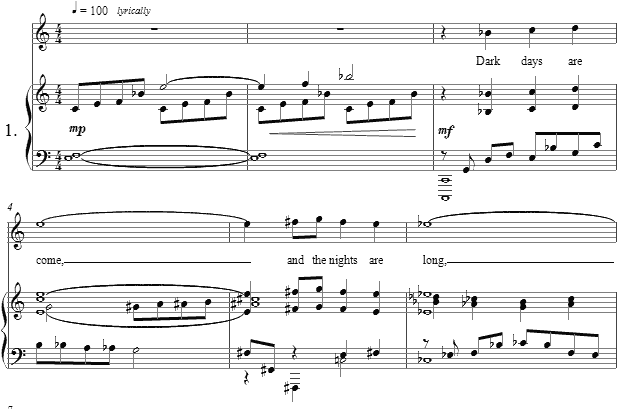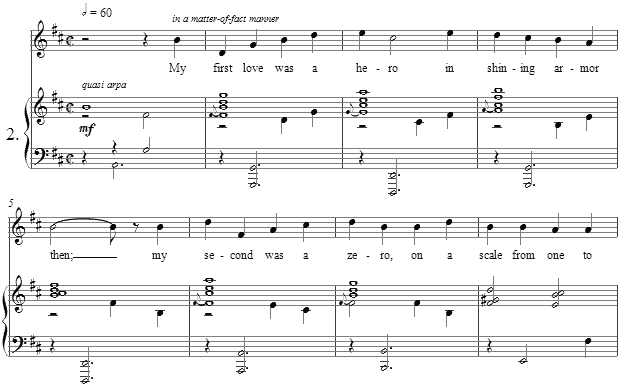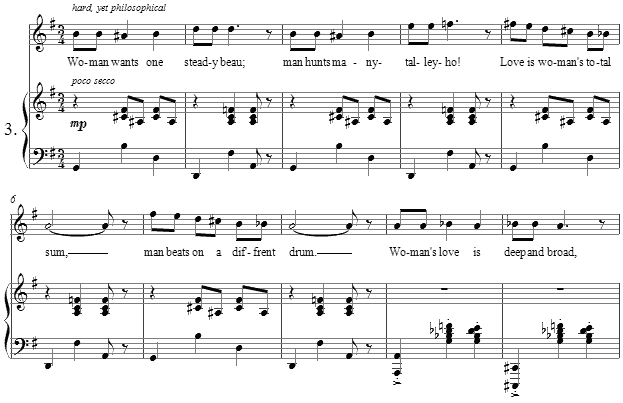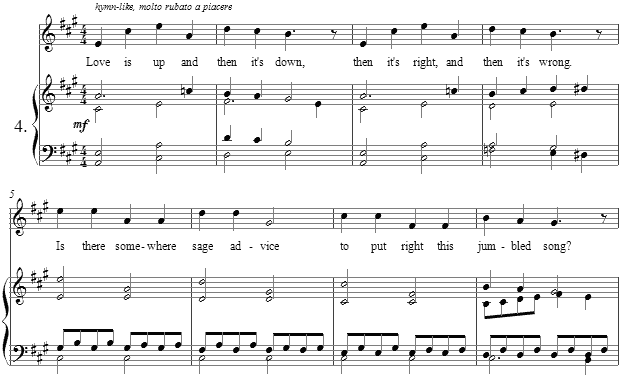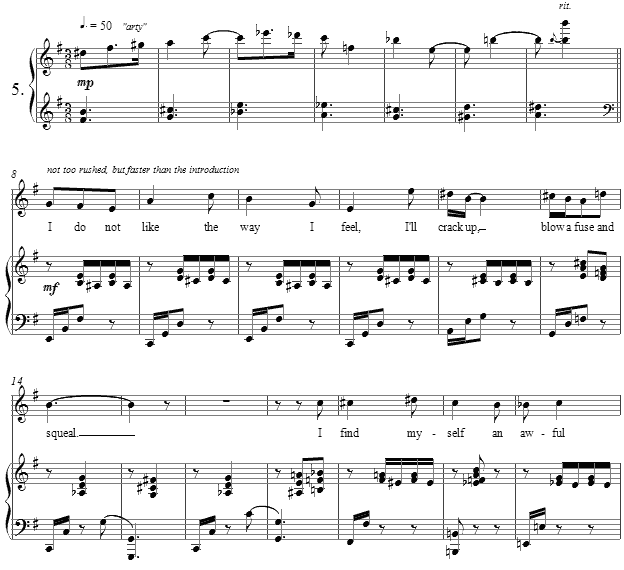Music and Texts of GARY BACHLUND
Vocal Music | Piano | Organ | Chamber Music | Orchestral | Articles and Commentary | Poems and Stories | Miscellany | FAQs
Love Songs - (1990 / rev. 2009)
Gary Bachlund
for mezzo soprano and piano
An appreciation of Dorothy Parker (1893-1967)
i. Romance Novel [ 1 page, circa 30" ]
Dark days are come,
And the nights are long,
As he turned numb
To a love that turned wrong.
ii. Cigarette Smoke [ 1 page, circa 40" ]
My first love was a hero
In shining armor then;
My second was a zero,
On a scale from one to ten;
My third went up in smoke,
My fourth was a joke.
I've lost count of the amount now.
Okeydoke?
iii. What About It? [ 1 page, circa 35" ]
Woman wants one steady beau;
Man hunts many -- tally-ho!
Love is woman's total sum,
Man beats on a different drum.
Woman's love is deep and broad,
Man suspects love will be fraud.
What can one make from all of this?
Like hell it is? Or is it bliss?
iv. Jumbled [ 1 page, circa 45" ]
Love is up and then it's down,
then it's right, and then it's wrong.
Is there somewhere sage advice
To put aright this jumbled song?
All loves' labors writers tell,
All love stories authors penned,
Say it's heaven and it's hell.
How then does the story end?
v. A Litany of Symptoms [ 4 pages, circa 2' 00" ]
I do not like the way I feel,
I'll crack up, blow a fuse and squeal.
I find myself an awful mess,
An awful truth it is, I guess.
I dread the dawn, and dread the night;
I hate I don't . . I hate I might . . .
I cannot find my inner peace,
My inner passions will not cease.
I need to break this devilish spell.
I need not feel quite this unwell.
I do not ail, I am not ill.
I have no reason to be shrill.
I am afflicted, in much distress,
And much, much more, I do confess!
I rant and rave and rage and roar.
I'd like to settle every score.
And when I think of love at all...
In love, its seems, I'm sure to fall.
And when I think of love at all...
In love, its seems, I'm soon to fall!
Copyright © 2009 Gary Bachlund All international rights reserved.
[ 8 pages, circa 4' 30" ]
Dorothy Parker
After some years are passed, the Parker anthology, Enough Rope, has become public domain in 2022. The original web page for settings "after" Ms. Parker's texts -- which at that time were under copyright in the US -- explains the paragraph below. I penned alternative texts in the spirit of Parker's genius in order to make the songs freely available. With her texts now in the public domain, the original song cycle is also available as a PDF below the other graphics.
This small cycle of "miniatures" for mezzo soprano (or soprano) and piano was composed in 1990 to Dorothy Parker's "Love Songs" texts, but over the ensuing years attempts to contact the estate management as regards publishing them with Parker's texts have proven unproductive. So this morning in mid-January of 2009, musing over her marvelous witticisms, I wrote parallel texts of the same general scansion and sympathies as a personal appreciation of her words and work. This is between Ms. Parker and me, and sidesteps the estate issues, costs and negotiations.
As my most significant teacher was also named Dorothy -- Dorothy Fries -- a small anecdote shows that acerbic side to love which Dorothy Parker [ 1 ] so well knew and which was the subject of much of her humor as well as ridicule. A woman with whom I was involved stupidly accused me of "being in love" with this Dorothy, who was more than thirty years my senior. There being many kinds of love, this was true in the most honorable sense but wildly untrue in the sullied sense in which it was meant in such a mean-spirited manner. Is there any wonder that a part of the greater fabric of love is also jealousy? And loss? As Dorothy Parker [ 2 ] reminds us with a note of consolation and encouragement, after all the stories end, love takes up again. The dramatis personae of this play merely change.
The first is a long-lined admission of short-lived lost in which the harmonies drift oddly.
The second is a gentle lyrical melody accompanied by widely spaced four-note chords.
The third is a waltz scherzo of sorts, pitting F sharp against the tonic G major.
The fourth is a hymn of sorts which ends without resolution.
The final setting is a rushing 3/8 with secondary dominants moving in many directions, in an extended verse form.
The scores for Love Songs for Dorothy, with the alternative texts by the composer, and Love Songs, to the original texts of Dorothy Parker from her anthology, Enough Rope (1926), are available as a free PDF downloads, though any major commercial performance or recording of the works are prohibited without prior arrangement with the composer. Click on the graphic below for these piano-vocal scores.
Texts by the composer
Texts of Dorothy Parker
NOTES
[ 1 ] Dorothy Parker (1893-1967) was born Dorothy Rothschild in West End, New Jersey, as the fourth and last child of Jacob Henry Rothschild. Parker's mother, Annie Eliza, died in 1898. Thereafter her father Jacob married in 1900 Eleanor Frances Lewis, a Roman Catholic; Parker never liked her stepmother. Eleanor Frances died three years after the wedding, and then Parker's father died when Parker was twenty.
Parker was educated at a Catholic school. "But as for helping me in the outside world, the convent taught me only that if you spit on a pencil eraser it will erase in," Parker said later in an interview. She moved to New York City, where she wrote during the day and earned money at night playing the piano in a dancing school. In 1916 Parker sold some of her poetry to the editor of Vogue, and was given an editorial position on the magazine. In 1917 she married Edwin Pond Parker II, a stockbroker, whom she later divorced. Edwin was wounded in World War I, he was an alcoholic, and during the war he became addicted to morphine.
From 1917 to 1920 Parker worked for Vanity Fair. Frank Crowinshield, the managing editor of the magazine, later recalled that she had "the quickest tongue imaginable, and I need not to say the keenest sense of mockery." With two other writers Robert Benchley and Robert Sherwood, Parker formed the nucleus of the Algonquin Round Table, an informal luncheon club held at New York City's Algonquin Hotel on Forty-Fourth Street. Other members included Ring Lardner and James Thurber. Parker was usually the only woman in the group. Alan Rudolph's film, Mrs. Parker and the Vicious Circle (1994), depicted the life of the author and her friends around the famous Algonquin Round Table.
Between the years 1927 and 1933 Parker wrote book reviews for The New Yorker. Her texts continued appear in the magazine at irregular intervals until 1955. Parker's first collection of poems, Enough Rope, was published in 1926. It contained the often-quoted 'Resumé' on suicide: "Razors pain you; / Rivers are damp; / Acids stain you;" which ends with the conclusion, "You might as well live."
Enough Rope became a bestseller and was followed by Sunset Guns (1928) and Death and Taxes (1931), which were collected in Collected Poems: Not So Deep As a Well (1936). Her poems were sardonic, usually dry, elegant commentaries on departing or departed love, or shallowness of modern life. Parker's short story collections, After Such Pleasures (1932) and Here Lies (1939), proved sharp understanding of human nature. Among her best-known pieces are 'A Big Blonde', which won her O. Henry Prize, and the soliloquies 'A Telephone Call' and 'The Waltz'.
During the 1920s Parker had extra-marital affairs, she drank heavily and attempted suicide three times, but maintained the high quality of her texts. In the 1930s Parker moved with her second husband, Alan Campbell, to Hollywood. She worked there as a screenwriter, including on the film A Star Is Born (1937), directed by William Wellman and starring Janet Gaynor, Fredric March, and Adolphe Menjou. The film received an Oscar for Best Original Story. In Alfred Hitchcock's film Saboteur (1940) Parker collaborated with Peter Vierter and Joan Harrison. Her contribution is mainly visible in some of the bizarre details of the circus the hero (Robert Cummings) takes refuge in, with its squabbling Siamese twins, its bearded lady in curlers and a malevolent dwarf who acts and dresses a bit like Hitler.
With Lillian Hellman and Dashiell Hammett, Parker helped found the Screen Writers' Guild. She also reported on the Spanish Civil War, and collaborated on several plays. Hollywood did not make Parker any softer, which a number of film stars had to face. When Joan Crawford was married to Franchot Tone, she became obsessed with self-improvement. Parker said: "You can take a whore to culture, but you can't make her think."Parker had taken an early stand against Fascism and Nazism and she declared herself a Communist, for which she was blacklisted during the McCarthy era. Her last major film project was The Fan (1949), directed by Otto Preminger. It was based on Oscar Wilde's play Lady Windermere's Fan, but Wilde's witty comments on society and Parker's updating did not amuse the audience. Later Preminger admitted that "it was one of the few pictures I disliked while I was working on it." Parker died alone on June 7, 1967 in the New York hotel that had become her final home. She left her estate to civil rights leader Martin Luther King, Jr.
[ 2 ] Ms. Parker's witty, original texts are:
Love Songs
i. Two-Volume Novel
The sun's gone dim, and
The moon's turned black;
For I loved him, and
He didn't love back.
ii. Pictures in the Smoke
Oh, gallant was the first love, and glittering and fine;
The second love was water, in a clear white cup;
The third love was his, and the fourth was mine;
And after that, I always get them all mixed up.
iii. General Review Of The Sex Situation
Woman wants monogamy;
Man delights in novelty.
Love is woman's moon and sun;
Man has other forms of fun.
Woman lives but in her lord;
Count to ten, and man is bored.
With this the gist and sum of it,
What earthly good can come of it?
iv. Theory
Into love and out again,
Thus I went, and thus I go.
Spare your voice, and hold your pen-
Well and bitterly I know
All the songs were ever sung,
All the words were ever said;
Could it be, when I was young,
Some one dropped me on my head?
v. Symptom Recital
I do not like my state of mind;
I'm bitter, querulous, unkind.
I hate my legs, I hate my hands,
I do not yearn for lovelier lands.
I dread the dawn's recurrent light;
I hate to go to bed at night.
I snoot at simple, earnest folk.
I cannot take the gentlest joke.
I find no peace in paint or type.
My world is but a lot of tripe.
I'm disillusioned, empty-breasted.
For what I think, I'd be arrested.
I am not sick, I am not well.
My quondam dreams are shot to hell.
My soul is crushed, my spirit sore;
I do not like me any more.
I cavil, quarrel, grumble, grouse.
I ponder on the narrow house.
I shudder at the thought of men....
I'm due to fall in love again.
Texts from Enough Rope, Poems by Dorothy Parker, Horace Liveright, 1926.

